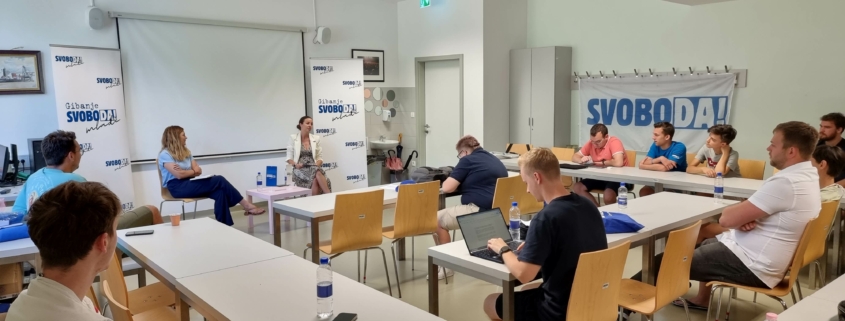On Saturday, 2 September, MEP Irena Joveva took part in a discussion at the Summer School organised by the Freedom Movement’s Youth Section (Gibanje Svoboda Mladi). They talked about her priorities and key activities, including efforts to end practices that discriminate against Slovenian on digital platforms, the European legislation on media freedom, and the recent floods in Slovenia and the EU’s response. “Events like this demonstrate how important it is to be part of this community,” said the MEP.
In particular, Joveva praised the rapid engagement and response of the European Commission. It is precisely for such cases that the European Solidarity Fund has been set up, she explained, adding that it has been utilised by Member States on numerous occasions and its deployment is increasing. Due to climate change natural disasters are occurring more and more frequently and on a larger scale, she noted.
“Natural disasters demonstrate how important it is to be part of the EU and to have such solidarity programmes in place.”
The young audience were also interested in the details of the letter sent by MEP Joveva and MEP Klemen Grošelj to the responsible European Commissioners regarding budgetary adjustments. As Joveva elucidated, the procedures within the European institutions are protracted and complex, but in many situations this could be remedied. In the case of the European budget, for example, the current rigid systems will have to be loosened; it seems that such disasters will become more frequent and a certain degree of flexibility in the allocation of resources will be inevitable in the future, she said.
“Member States ought to have a greater capacity to adapt in the event of such unforeseeable yet serious and catastrophic events. Slovenia’s priorities and needs have changed, so it is crucial to allow at least some flexibility in the use of EU funds.”
When asked about her recent activities regarding the use of Slovenian on digital platforms, the MEP replied that starting her term of office, she did not think she would pay so much attention to the Slovenian language, but she realised that it is an issue of great relevance which remains unresolved. We talk a great deal about linguistic diversity, equality of all the official languages of the European Union, however, in reality this is not the case, she declared.
“In fact, the digital world and the physical world have become one, they are no longer separate at all. Quite possibly, the digital world will become increasingly prominent, therefore the official languages of the European Union must become truly equal in the digital world as well. Discrimination is not an option, and I do not buy or accept the excuses of the multinationals.”
She stressed that she was doing everything in her power to ensure that her calls for the use of Slovenian in the digital world are heeded. At national level, the situation is being resolved through the amendment of the act on the public use of the Slovenian language, while at the European level, she proposed or supported amendments to the European Media Freedom Act, for which she is rapporteur on behalf of her political group Renew Europe, which aim to ensure that all official languages of the Union are used and respected.
“Under the existing European legislation, say in the case of Netflix, which is based in the Netherlands, the company is only subject to Dutch law and accountable to Dutch regulators. We want to change the European legislation in such a way that the competence of, for example, Slovenian regulators can be transferred to their Dutch counterparts, who could require Netflix to put an end to infringements in Slovenia or any other Member State.”
Moreover, the MEP added amendments to the Digital Services Act (DSA), which has just entered into force, that apply to digital giants such as Meta or Twitter. She highlighted the example of content moderation on these platforms when certain information is incorrect or the new advertising rules have been breached. Currently, such alerts only work well in major languages such as English. “One of my contributions to this regulation is that such alerts should be published in all EU languages, without discrimination. And the people who will be checking and writing this information must have a good understanding of the language. Thus, in the case of Slovenian, this should be checked by people who are proficient in our language.” She submitted a similar amendment to the aforementioned Media Freedom Act, which has been the focus of her recent work. “Not least because of the rise of artificial intelligence, it is simply necessary to have someone who then checks these generated texts, translations of news, posts or videos.”
The MEP concluded the discussion by considering the future of the European Union. In her view, the current term has been very turbulent, and challenges remain in many areas. At the same time, she believes that the profile of the European Parliament should be raised and the institution made more transparent.





Leave a Reply
Want to join the discussion?Feel free to contribute!